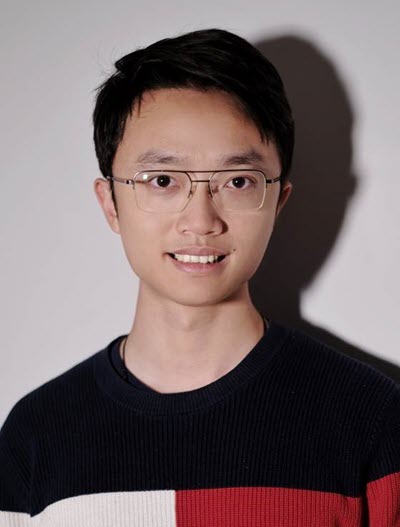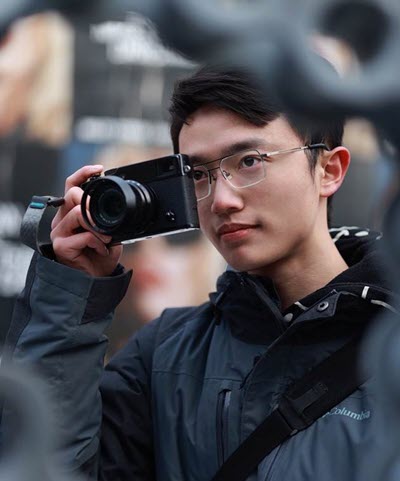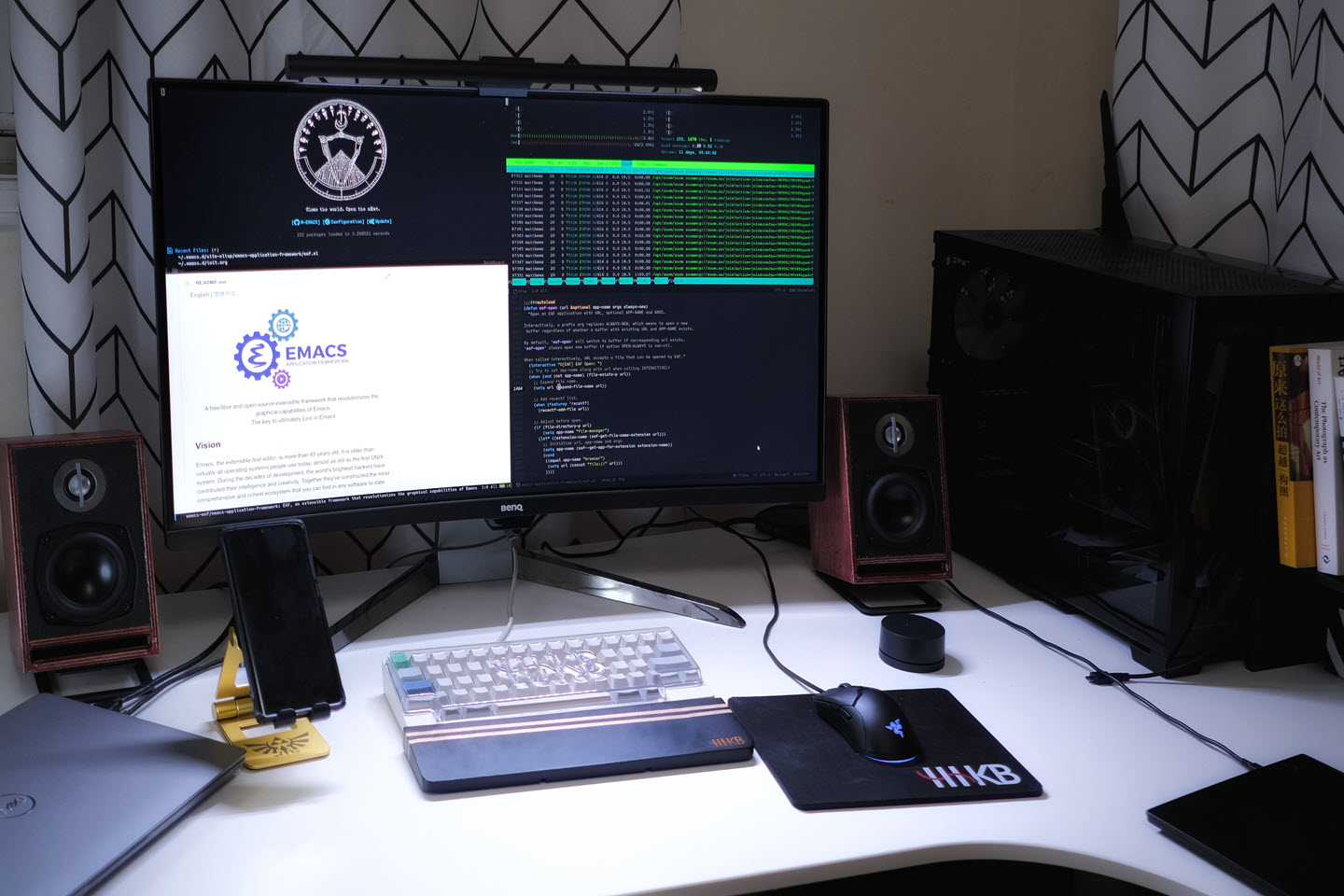Today we have the pleasure of talking with Mingde (Matthew) Zeng. Matthew fell in love with Emacs when he entered college and is now a distinguished member of many Emacs communities such as Emacs China, and has spoken at multiple Emacs conferences. Matthew was first introduced to HHKB at the Linux Foundation's 2022 Open Source Summit in Austin, Texas. After visiting the booth, he instantly cherished the keyboard layout, and after acquiring his first HHKB during the event, he never looked back.
HHKB Team: Hi Matthew, tell us about yourself.
Mingde Zeng: My name is Mingde Zeng, but I go by Matthew. I work as a Software Developer at
ActiveState, a company dedicated to Open Source supply chain security. I graduated from the University of Waterloo in
Ontario, Canada with a major in Computational Mathematics, which is a combination of computer science and mathematics. I
am originally from Huizhou, a city in China near Hong Kong, I moved to Toronto Canada when I was 10 years old. Outside
my day job, I am active in the Emacs communities such as Reddit
r/emacs and Emacs China, and I help
maintain packages like the Emacs Application Framework. In addition, I am also a photographer, I specialize in street,
portrait photography and photojournalism.

HHKB Team: What got you started with programming?
Mingde Zeng: I was always a big sci-fi fan and cyberpunk fan (laugh), and I've loved computers since
I was a kid. I used to play a lot of games and I love tinkering with mods and configurations. In grade 10, I took my
first computer science class and learned Python, that was my starting point with real programming.
HHKB Team: And then when you continued on to university, what types of programming did you learn?
Mingde Zeng: At university, I learned programming languages including Python, Java, C, C++, Racket (a
dialect of Lisp), etc. In 2019, I interned as a software developer in Toronto, and a coworker introduced me to Emacs. This experience
changed how I think about programming and introduced me to the world of open source. I realized that this is where
my passion lies.
HHKB Team: So, tell us more about Emacs
Mingde Zeng: Emacs is an extensible editor created in the 70s by Richard Stallman, the man who
started the free software movement, and the origin of open source. It's infinitely configurable to the point where I
would call it a programming environment disguised as an editor. You can do virtually anything in Emacs, and it is
designed to give maximum freedom to users. It fundamentally changed my understanding of code collaboration. This
helped me to understand what "open source" and "free software" truly meant.
HHKB Team: Very cool. So, you are a programmer for an open-source company and you use Emacs in your work?
Mingde Zeng: Definitely. In my day job, my role is maintaining a clean software dependency tree, such
as making sure package A which depends on package B that may or may not conflict with package C, are all built
successfully. The dependency tree extends all the way down to the system level. All of these require working with
different build systems and source codes of many languages, and interactions with shell terminals. Things can be
fragmented and get quite messy, but Emacs helped integrate all of those together. I can usually find what I need
through a couple of keystrokes. As for my involvement in the community, my love for Emacs and open source led me to
participate in and contribute to various projects, including maintaining packages with ManateeLazycat, particularly
the Emacs
Application Framework, and becoming a moderator for the Emacs China community.
HHKB Team: And do you do any speaking at conferences for the Emacs community?
Mingde Zeng: Yes. I have spoken at the EmacsConf since 2020, the largest virtual Emacs conference
occurring annually near the end of the year. I just spoke at EmacsConf 2022. My talks are about the Emacs
Application Framework and LSP-bridge.

HHKB Team: How does HHKB fit into your programming life?
Mingde Zeng: Emacs is completely keyboard-centric, it's all about keyboard shortcuts using the
Control, and Alt keys in combination with all the other keys. The primary key that you press all the time is Control.
The classical keyboard layout has the Control key on the bottom left corner of the keyboard and you press it using the
tip of the pinky finger. Because you need to use it so much the more you type on it, it's going to strain the pinky
because the pinky is not designed to handle such a heavy task load. I've seen a lot of people in the Emacs community
who've been using Emacs for decades and they have this “Emacs pinky” problem that is medically called
Repetitive Strain Injury. One of the most popular solutions in the community is remapping the Control key to the
CapsLock key, which positions the Control key at a bigger, easier-to-reach location. And when I discovered HHKB at the
Open Source Summit in 2022, I
was impressed by its bold design that dared to challenge the traditional keyboard layout by moving the Control key to
the place of the CapsLock key at a fundamental hardware level. (Read more
about the mystery behind the CTRL key and unique HHKB layout).
HHKB Team: What about remapping the keys to accomplish that same thing?
Mingde Zeng: Well, when you remap the keys you do it through the software on a computer. For someone
like me who has different computers (work, home, travel), I'd need to remap each of those different computers. From
the hardware level, when compared to an ordinary keyboard, the 60 key position is very compact, I can bring this
anywhere I want, can be home, the office, outside, to a friend's house, or even on a vacation.
HHKB Team: It is our understanding that you have both an HHKB Classic and an HHKB HYBRID Type-S. In terms of sound, do you prefer silent versus regular noise with the Classic?
Mingde Zeng: I personally like the Classic because I appreciate the sound.
HHKB Team: Do you ever game on the HHKB?
Mingde Zeng: Yes, I even play Hollow Night and Cuphead on HHKB!
HHKB Team: How familiar were you with mechanical keyboards before you met us at our booth during the Open Source Summit in 2022 and learned about HHKB?
Mingde Zeng: I had used a couple of mechanical keyboards prior to my HHKB, all Cherry switches, brown and red, I even own a Model M.
HHKB Team: Did HHKB put you on Team Topre now for switches or do you still like that kind of
traditional mechanical switch?
Mingde Zeng:I'm very happy with it. I'm going to stay with HHKB for the foreseeable future. I like the design of it and it is a healthier choice for my hands.
HHKB Team: What about aesthetics and customization—would you like to see more of those things
in the future?
Mingde Zeng: Yes, definitely. The default color is very, very good but I know that the keyboard
community and people love to customize their keyboards and because the Topre key is not a Cherry key, people have a harder time
finding keycaps for their keyboards.
HHKB Team: What is your favorite part about HHKB? If you had to say just one feature?
Mingde Zeng: The Control key (laughing).
HHKB Team: Control key. OK, I thought you were going to say that. Yeah. (laughing).
HHKB Team: Finally, where do you see yourself in five years?
Mingde Zeng: I will stay in the open-source industry, it is where my passion lies. Open source is also very huge now, it is at the point where it is really getting traction from everywhere, including the government.
HHKB Team: That's great to hear. It's been a pleasure speaking with you Matthew! Thank you so much
for talking with us!
Mingde Zeng: Thank you for inviting me to this interview! Let me know if you have any other questions
in the future.
Be sure to check out Matthew's social links below:
Emacs China: https://emacs-china.org/
Reddit: https://www.reddit.com/r/emacs
My EmacsConf 2022 talk: https://emacsconf.org/2022/talks/lspbridge/
Instagram: https://www.instagram.com/mt.photographyx/
Photo Credits: Matthew Zeng

